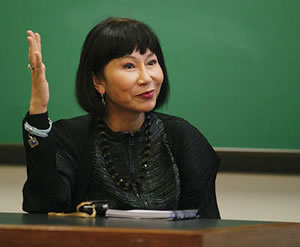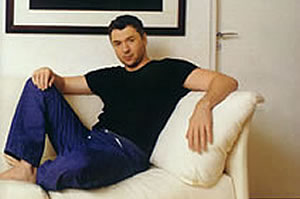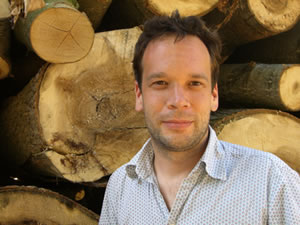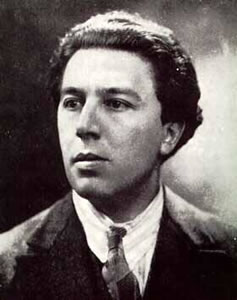De Amerikaanse schrijfster en essayiste Siri Hustvedt werd geboren op 19 februari 1955 in Northfield, Minnesota. Zie ook mijn blog van 19 februari 2007 en ook mijn blog van 19 februari 2009.
Uit: The Shaking Woman Or A History Of My Nerves
„When my father died, I was at home in Brooklyn, but only days before I had been sitting beside his bed in a nursing home in Northfield, Minnesota. Although he was weak in body, his mind remained sharp, and I remember that we talked and even laughed, though I can’t recall the content of our last conversation. I can, however, clearly see the room where he lived at the end of his life. My three sisters, my mother, and I had hung pictures on the wall and bought a pale green bedspread to make the room less stark. There was a vase of flowers on the windowsill. My father had emphysema, and we knew he would not last long. My sister Liv, who lives in Minnesota, was the only daughter with him on the final day. His lung had collapsed for the second time, and the doctor understood that he would not survive another intervention. While he was still conscious, but unable to speak, my mother called her three daughters in New York City, one by one, so we could talk to him on the telephone.
I distinctly remember that I paused to think about what I should say to him. I had the curious thought that I should not utter something stupid at such a moment, that I should choose my words carefully. I wanted to say something memorable— an absurd thought, because my father’s memory would soon be snuffed out with the rest of him. But when my mother put the telephone to his ear, all I could do was choke out the words “I love you so much.” Later, my mother told me that when he heard my voice, he smiled.
That night I dreamed that I was with him and he reached out for me, that I fell toward him for an embrace, and then, before he could put his arms around me, I woke up. My sister Liv called me the next morning to say that our father was dead. Immediately after that conversation, I stood
up from the chair where I had been sitting, climbed the stairs to my study, and sat down to write his eulogy. My father had asked me to do it. Several weeks earlier, when I was sitting beside him in the nursing home, he had mentioned “three points” he wanted me to take down. He didn’t say, “I want you to include them in the text you will write for my funeral.” He didn’t have to. It was understood.“

Siri Hustvedt (Northfield, 19 februari 1955)
De Engelse schrijfster Helen Fielding werd geboren in Morley, Yorkshire op 19 februari 1958. Zie ook mijn blog van 19 februari 2009.
Uit: Cause Celeb
„It used to seem extraordinary to me that someone like Henry could actually exist, extraordinary that a person could be transported into an environment so alien to his own, and remain so utterly unaffected by his surroundings. It was as if he had been coated with a very strong sealant, the sort of thing they use to paint on oceangoing yachts.
Henry was spreading thick cut luxury marmalade from a Fortnum and Mason’s jar on a piece of Nambulan unleavened bread.
“Got up this morning, didn’t Boris Believe it—family of eight outside my hut wanting to move their tent nearer the river. I said to the chap, ‘I thought this was a bloody refugee camp, not a holiday camp, but you go ahead, mate, by all means. Never mind the old malnutrition—you go for the view.'”
Breakfast was taken in Safila, just after dawn. It was a quiet time, the hour before the heat became intolerable, with the silence broken only by the rooster and Henry, who was incapable of shutting up except when he was asleep. I was particularly annoyed by Henry that morning, because I suspected he had started an affair with one of our more emotionally fragile nurses, Sian. She was sitting next to him now, giving him a look you could have spread on a piece of toast. Sian was a sweet-natured girl who had joined us two months ago, after returning early from night shift to find her husband of eighteen months in bed with a Turkish minicab driver. Her therapy was being continued via correspondence.“

Helen Fielding (Morley, 19 februari 1958)
De Estlandse schrijver Jaan Kross werd geboren op 19 februari 1920 in Tallin. Zie ook mijn blog van 19 februari 2007 en ook mijn blog van 19 februari 2008 en ook mijn blog van 19 februari 2009.
Uit: Der Verrückte des Zaren (Vertaald door Helga Viira)
« WOISECK, DONNERSTAG, DEN 26. MAI 1827. Zunächst möchte ich den Anlaß festhalten, der mich dieses Tagebuch beginnen läßt. Ja, ich schreibe »beginnen«, denn ob ich es fortführen werde, ist nicht abzusehen. Es scheint mir überaus zweifelhaft — weder die Zeit noch das Land noch gar unsere Familie sind geeignet für das Führen eines Tagebuches. Wenn überhaupt ein Tagebuch, kann es allenfalls ein völlig geheimes werden. Und gerade deshalb ist es möglich, den Grund seines Entstehens gleich zu Anfang auszusprechen.
Also: Ich habe mich entschlossen, Tagebuch zu führen, weil ich in Dinge verstrickt bin, die meines Erachtens so ungewöhnlich sind, daß ein denkender Mensch, der ungewollt ihr Zeuge geworden ist, nicht umhinkann, den Versuch zu unternehmen, seine Beobachtungen niederzuschreiben. Möglich,
daß nur ein oberflächlicher Denker so handelt. Jemand, der tiefer in die Dinge eindringt, würde bestimmt auf jegliche Aufzeichnungen verzichten. Weiß Gott.
Freilich, wenn ich zurückschaue, muß ich bekennen: Ich bin nicht erst jüngst in all das hineingeraten. Seit zehn Jahren bereits, nein, viel länger, bin ich darin verwickelt. Ich selbst habe mich in dieser Zeit in ein Kuriosum verwandelt. Denn welch anderer Bauernjunge aus der Gemeinde Holstfershof hätte in all den Jahren, man kann sagen seit 1814, das lernen und sehen können, was mir eine Reihe von Zufällen, die wechselten wie die Kulissen in einer italienischen Oper, zu Augen kommen ließ .. .
Also, heute vor zwei Wochen sind wir bei heftigem Frühlingsregen aus Petersburg hier in Woiseck eingetroffen: Eeva, der achtjährige Jüri, den sie entgegen meinem Ratschlag nach Petersburg mitgenommen hatte, Timo, der Diener Käsper, das Zimmermädchen Liiso und ich. Und der Kutscher Juhan natürlich. Des weiteren ein Feldjäger und drei Gendarmen. »

Jaan Kross (19 februari 1920 – 27 december 2007)
De Duitse schrijver Herbert Rosendorfer werd op 19 februari 1934 in Gries geboren. Zie ook mijn blog van 19 februari 2007 en ook mijn blog van 19 februari 2008 en ook mijn blog van 19 februari 2009.
Uit: Briefe in die chinesische Vergangenheit
“Erster Brief
(Mittwoch, io. Juli)
Treuer Freund Dji-gu.
Die Zukunft ist ein Abgrund. Ich würde die Reise nicht noch einmal machen. Nicht das schwärzeste
Chaos ist mit dem zu vergleichen, was unserem bedauernswerten Menschengeschlecht bevorsteht. Wenn ich könnte, würde ich sofort zurückkehren. Ich fühle mich in eine Fremde von unbeschreiblicher Kälte hinausgeworfen. (Obwohl es auch hier Sommer ist.) Für heute nur soviel: ich bin, in Anbetracht der ungewöhnlichen Art meiner Reise, leidlich gut angekommen. Ich kann nur rasch diese Zeilen kritzeln und den Zettel an den Kontaktpunkt legen. Ich hoffe, Du findest ihn. In Liebe grüßt Dich Dein
Kao-tai
Zweiter Brief
(Samstag, ‘3. Juli)
Teurer Freund Dji-gu.
Die Zukunft ist ein Abgrund. Ich glaube, ich habe diesen Satz schon auf den Zettel geschrieben, den ich Dir vor drei Tagen an den Kontaktpunkt gelegt habe — hoffentlich hast Du ihn gefunden und machst Dir keine Sorgen um mich. Was ich hier erlebe, ist so vollständig anders als das, was Du kennst und was ich gewohnt bin, daß ich gar nicht weiß, womit ich meine Schilderung beginnen soll. Hier — ich müßte eigentlich nicht »hier« sagen, sondern »jetzt«. Aber dieses »jetzt« ist so unvorstellbar fremd., daß es mir schwerfällt, an die Identität dieses »Ortes« mit dem Ort zu glauben, an dem Du — durch genau tausend Jahre getrennt — lebst.
Tausend Jahre, das weiß ich nun, sind ein Zeitraum, den der menschliche Verstand nicht fassen kann. Gewiß: Du kannst zählen — eins, zwei, drei … bis tausend — und Dir dabei vorzustellen versuchen, es vergehe jedesmal ein Jahr dabei, Geschlechter, Kaiser, ganze Dynastien wechselten, die Sterne wanderten … “

Herbert Rosendorfer (Gries, 19 februari 1934)
De Amerikaanse schrijfster Amy Tan werd geboren in Oakland, Ohio, op 19 februari 1952. Zie ook mijn blog van 19 februari 2007 en ook mijn blog van 19 februari 2009.
Uit: Feathers from a Thousand Li Away
„The olde woman remembered a swan she had bought many years ago in Shanghai for a foolish sum. This bird, boasted the market vendor, was once a duck that stretched its neck in hopes of becoming a goose, and now look! – it it too beautiful to eat.
Then the woman and the swan sailed across an ocean many thousands of li wide, stretching their necks towards America. On her journey she cooed to the swan: “In America I will have a daughter just like me. But over there nobody will say her worth is measured by the loudness of her husband’s belch. Over there nobody will look down on her, because I will make her speak only perfect American English.And over there she will always be too full to swallow any sorrow! She will know my meaning, because I will give her this swan– a creature that became more than what was hoped for.”
But when she arrived in the new country, the immigration officials pulled her swan away from her, leaving the woman fluttering her arms and with only one swan feather for a memory. And then she had to fill out so many forms she forgot why she had come and what she had left behind.
Now the woman was old. And she had a daughter who grew up speaking only English and swallowing more Coca-Cola than sorrow. For a long time now the woman had wanted to give her daughter the single feather and tell her, “This feather may look worthless, but it comes from afar and carries with it all my good intentions.” And she waited, year after year, for the day she could tell her daughter this in perfect American English.“

Amy Tan (Oakland, 19 februari 1952)
De Russische schrijver Dmitri Lipskerov werd geboren op 19 februari 1964 in Moskou. Zie ook mijn blog van 19 februari 2007 en ook mijn blog van 19 februari 2008 en ook mijn blog van 19 februari 2009.
The Last Sleep of Reason (vertaald door Dmitri Priven)
“But that day did not see the Guinness Book of Records man, the Bulgarian Zhechka Zhechkov, show up. A special courier arrived at the hospital, announcing that on that day, in one of the city parks there was to be cook-up of a record quantity of perogies. Two hundred and fifty thousand of them were to
be cooked simultaneously in one hundred cauldrons and consumed by a thousand eaters. The last thing the courier said was that the Guinness representative would show up the following day with a group of independent medical experts.
“Those bloody guzzlers!” concluded Sinichkin and sighed, for his dreams would not be coming true for another day. Yet the night brought an unbearable chill to Volodya’s thighs. The chill went right to the bone of detective’s limbs; he reached under the blanket and discovered that the diaphanous skin on his legs was covered with ice, that is to say, hoarfrost.
“My body temperature is negative,” concluded the captain and whimpered for the nurse.
The nurse called Petrovna appeared and rubbed Volodya’s frigid legs warm with alcohol until dawn, humming something ancient for the poor darling to fall asleep.
The captain dozed off, but found his legs in the morning drastically thinner. It was as if the limbs had deflated in half, like balloons. They did not require three beds anymore; two was enough.
The assistant – that is, the acting head physician – was called in; after examining Sinichkin, he frowned and lamented reproachfully: “Why couldn’t you wait until the evening! The Guinness man is coming today, you know!”

Dmitri Lipskerov (Moskou, 19 februari 1964)
Zie voor nog meer schrijvers van de 19e februari ook mijn vorige twee blogs van vandaag.











